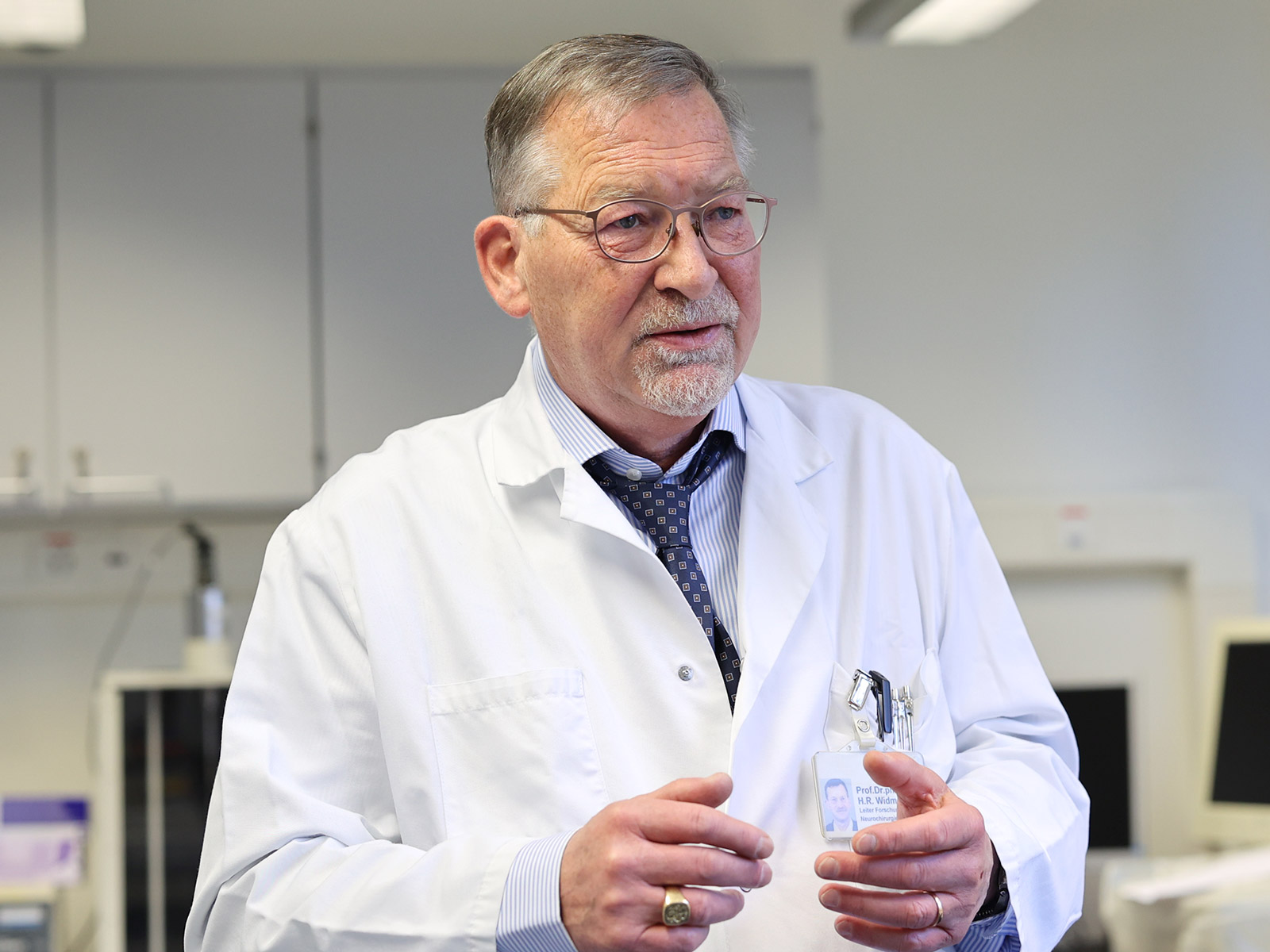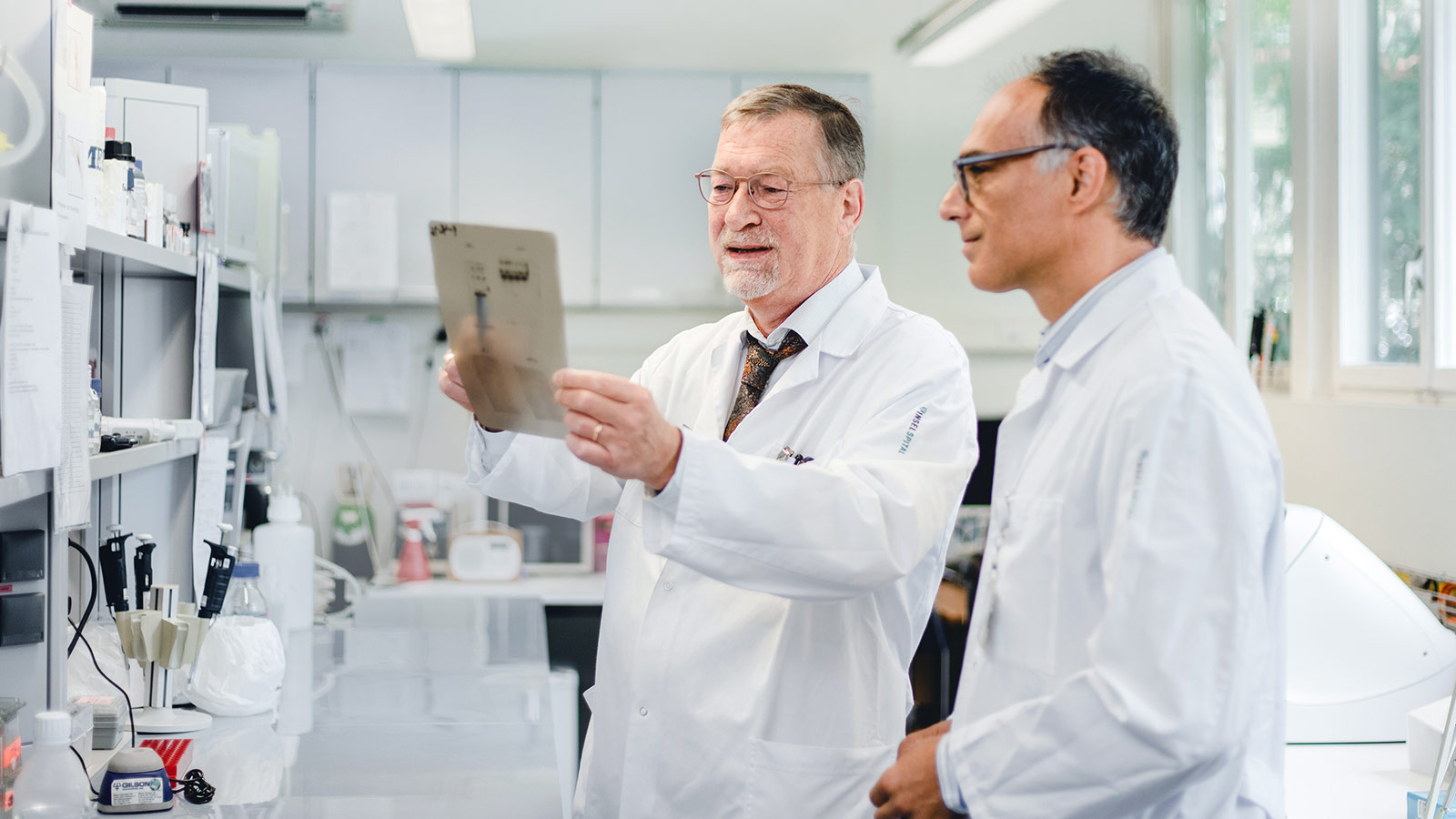Thirty years after the founding of the renowned research laboratory for restorative neuroscience at the Department of Neurosurgery, its long-standing director, Prof. Dr. Hans Rudolf Widmer, is taking his well-deserved retirement. We conducted an interview with him.
The end of February will mark a turning point. After 30 years of fundamental neuroscientific research, the research laboratory at the University Hospital's Department of Neurosurgery is changing its focus. With the retirement of Prof. Widmer, the emphasis on restorative medicine, which seeks new therapeutic approaches to neurodegenerative diseases such as Parkinson's or Alzheimer's, will be discontinued.
Internationally recognized research
Countless scientific publications, 14 master's theses, and 28 doctoral dissertations have been produced here under the guidance of Prof. Dr. Hans Rudolf Widmer, who took over as head of the laboratory in 1996. Widmer, an expert on Parkinson's disease, is a member of numerous national and international professional associations, a sought-after speaker at international conferences, a lecturer at the University of Bern's Faculty of Medicine and Natural Sciences, an expert reviewer for national and international research projects, and recipient of the 2018 Bernard Sanberg Memorial Award for his substantial achievements in the field of research into new therapeutic approaches.
Research through the ages
Originally founded in 1992 by Prof. Christian Spenger and Prof. Lorenz Studer as one of the first research laboratories for brain cell transplants in Parkinson's disease, basic research is now giving way to the development of robotics for surgical procedures, a new translational focus in neurosurgery for which a professorship at the medical faculty is planned in the future.
Interview with Prof. Hans Rudolf Widmer
Hans Ruedi, you have been managing the research laboratory for over 25 years, since 1996 to be precise. Was that also your first year at Inselspital?
Widmer: Yes, exactly. I was previously employed in the anatomy department at the University of Bern. Before that, I was a postdoc and research fellow in the USA. I came to the anatomy department in Bern in 1993 with the idea of establishing neuroscience there. But then, for various reasons, the neuroscience department had to close. It was extremely interesting there, and I learned a great deal, but it wasn't the field of neuroscience that interested me so much. And that's why I moved to Inselspital in 1996 as head of the research laboratory at the Department of Neurosurgery.
Was 1996 also the year the research laboratory was founded?
Widmer: No, the research laboratory was founded in 1992. The first brain cell transplants for Parkinson's disease were performed in the late 1980s. My predecessor at the research laboratory, Prof. Christian Spenger, and his colleague Prof. Lorenz Studer were keen to carry out this procedure in Bern as well. The then director of neurosurgery, Prof. Dr. Rolf Seiler, provided the necessary funds. And so the research laboratory was founded. In February 2022, the research laboratory will have been in existence for exactly 30 years.
The research laboratory is called the Research Laboratory for Restorative Neuroscience. What exactly does that mean?
Widmer: Yes, it's a very specific term. In neuroscience, we talk about «restorative medicine» or «regenerative medicine». These terms are not strictly defined, but basically they refer to the search for new therapeutic approaches for neurodegenerative diseases such as Parkinson's. The research focuses on growth factors, nerve-supportive substances, brain cell transplants, endogenous neurogenesis, i.e., the formation of new nerve cells in the brain, the repair of damaged nerve cells, and the removal of deposits in the brain. That is essentially the field we are dealing with.
How many employees did the research laboratory have?
Widmer: Of course, this wasn't always the case; it depended heavily on third-party funding, such as grants from the Swiss National Science Foundation. We also collaborated and exchanged ideas with the University of Odense in Denmark and the University of Seville in Spain. That's why we often had doctoral students from these universities working with us. There were a maximum of 10 people, including the doctoral students. The core staff in the research laboratory consisted of the director, two laboratory assistants, and the research assistants.
Looking back now on your 25 years working in the neurosurgery research lab, what meant the most to you? What were your highlights?
Widmer: First and foremost, the people we help with our research have always been very important to me. But of course there have been other highlights that I look back on fondly. These include, for example, the research awards that we have won with our clinic, i.e., all the awards with students, travel awards, etc. These have always been something special for me. And, of course, the four or six National Science Foundation grants I received, twice as an applicant and four times as the principal investigator, were also immensely important for my research. A grant like that is always a real highlight. And then, of course, there was the award ceremony from the American Society for my life's work. I also always really enjoyed organizing conferences. That was really wonderful. Bringing so many people together like that.
Did you originally study biology?
Widmer: I studied natural sciences at ETH Zurich and the University of Zurich, specifically biology and pharmacology. I then obtained my diploma as a secondary school and university teacher. Teaching is something I have always enjoyed doing. I have been giving regular lectures for years, and actually continue to do so today.
So passing on knowledge is a recurring theme throughout your entire biography?
Widmer: Yes, that's actually the case.
You then went to California as a postdoc. Did you ever consider staying in the US and continuing your research there? Did you always want to come back to Switzerland?
Widmer: No, I didn't really want to go back to Switzerland. I had an offer there as a research assistant professor with good conditions and was able to publish a lot of good work. The problem, as is so often the case, was my family situation. My wife is a pharmacist and couldn't work in the US. Our son had to go to school. We were living in Los Angeles at the time, and the quality of public schools in the US is rather poor. Private schools, however, were incredibly expensive. Another important reason was that my boss, my postdoctoral supervisor, left to work in industry. He had been a great support to me. So there were two reasons for returning to Switzerland.
And you didn't want to switch to industry? Surely that would have been possible too?
Widmer: Yes. But the problem was that I wasn't American and didn't have a green card. I had lots of inquiries from headhunters. And whenever they heard I was Swiss, their interest quickly waned. But basically, my wife and I really liked the American way of life. Los Angeles is beautiful. Especially the weather. And in two hours we could be at the sea or in the mountains, surrounded by the most beautiful nature. The scenery was simply wonderful. And in terms of research, the conditions were ideal, very stimulating, completely different from Switzerland at the time. But then I thought to myself, if I can move to Bern and have the opportunity to build something new there, that's also interesting. And in the long term, research work in the US is incredibly competitive.
Which research project interested you the most?
Widmer: Stefano Di Santo joined our research laboratory in 2009. He came with an interesting topic: growth factors released by stem cells. He then won the Pfizer Research Prize, and we wrote a National Science Foundation grant application together. Part of it consisted of his research, but we also explored the whole thing in the context of stroke and Parkinson's disease and so on. This caused a real boom, and Stefano was a pioneer in this field. We now know that when stem cells are transplanted after a stroke, they do not primarily differentiate and replace the damaged cells, but rather release substances that stimulate the brain's own regeneration. The stem cells also activate the immune system in the brain, so that macrophages eat away the damaged brain cells. So our areas of research complemented each other quite well.
How difficult is it for you to say goodbye to Inselspital now?
Widmer: Yes, I'm still clinging on to 20% (laughs). No, of course it's very difficult for me. I mean, I used to be here in the research lab every Saturday, and I was rarely home before midnight. I always had to leave at 11:30 p.m., otherwise I would have missed the last train. But 12-hour days or 60–80 hours a week were normal.
Saying goodbye to the research lab is a little less difficult for me now, because the two Covid lockdowns, especially the first one, when we weren't all vaccinated yet and had to stay at home for a few months and close the lab, prepared me for it a little. In recent weeks, we have cleared out everything here in the lab and thrown a lot of things away. For example, thousands of sections, much to the frustration of the lab technician who has been cutting brains for 10 years. Yes, things like that are really very difficult. Because you were already kind of married to the research here at the research lab.
What are your plans for retirement? Do you have any plans?
Widmer: Well, I'm not worried about getting bored next year. There are certain things I still need to finish, such as graduate school and my lectures. Then I still have a few doctoral students until 2023. I'm also president of the animal testing commission for the cantons of Bern and Lucerne. It's very interesting, but also a very responsible position. It covers all kinds of things, from fish, mice, and rats to horses, cows, and even llamas—basically large animal husbandry. And you can do that until you're 80 (laughs). It's also a lot of work, because I have to write about 60 expert reports per year for the applications
So you're not stopping work altogether, you're just reducing your hours?
Widmer: Yes, I always arrive at noon (laughs). No, I also have a big house where I always have a lot of work and DIY to do. It's an old house, and we moved in just before the first lockdown. My wife will definitely be working until the end of the year. My son always wants me to get a dog. But no, you always have to look after it and can't leave it alone, so you can't do anything else. So I'm not ready for a dog yet. No, seriously, I'm looking forward to reading something other than scientific articles for a change. Maybe we'll travel a bit. I used to travel a lot to conferences. I had four or five international conferences that I traveled to for 20 years. I have relatives in Brazil, South Africa, and Canada whom I haven't visited in a long time. I would very much like to go back to Africa, to Cape Town. My sister and I have an alpine hut there. And I also really enjoy hiking and looking for plants. My wife is a pharmacist, so of course she knows all the medicinal plants. All in all, I would say I need to relax a bit first. All those years of hard work have taken their toll.


